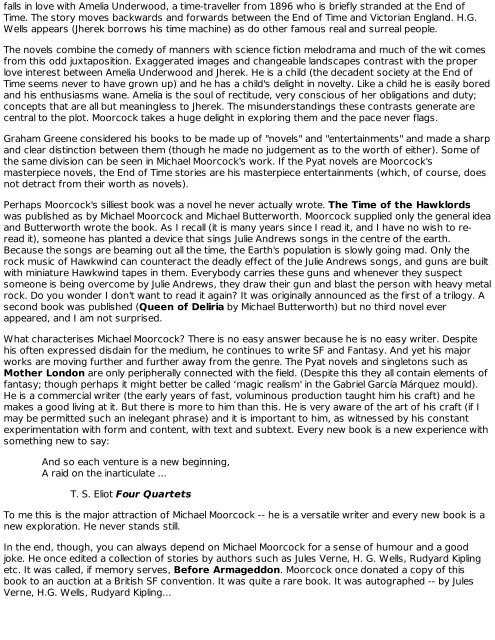Triffids Beard 2 - The Bearded Triffid
Triffids Beard 2 - The Bearded Triffid
Triffids Beard 2 - The Bearded Triffid
You also want an ePaper? Increase the reach of your titles
YUMPU automatically turns print PDFs into web optimized ePapers that Google loves.
falls in love with Amelia Underwood, a time-traveller from 1896 who is briefly stranded at the End of<br />
Time. <strong>The</strong> story moves backwards and forwards between the End of Time and Victorian England. H.G.<br />
Wells appears (Jherek borrows his time machine) as do other famous real and surreal people.<br />
<strong>The</strong> novels combine the comedy of manners with science fiction melodrama and much of the wit comes<br />
from this odd juxtaposition. Exaggerated images and changeable landscapes contrast with the proper<br />
love interest between Amelia Underwood and Jherek. He is a child (the decadent society at the End of<br />
Time seems never to have grown up) and he has a child's delight in novelty. Like a child he is easily bored<br />
and his enthusiasms wane. Amelia is the soul of rectitude, very conscious of her obligations and duty;<br />
concepts that are all but meaningless to Jherek. <strong>The</strong> misunderstandings these contrasts generate are<br />
central to the plot. Moorcock takes a huge delight in exploring them and the pace never flags.<br />
Graham Greene considered his books to be made up of "novels" and "entertainments" and made a sharp<br />
and clear distinction between them (though he made no judgement as to the worth of either). Some of<br />
the same division can be seen in Michael Moorcock's work. If the Pyat novels are Moorcock's<br />
masterpiece novels, the End of Time stories are his masterpiece entertainments (which, of course, does<br />
not detract from their worth as novels).<br />
Perhaps Moorcock's silliest book was a novel he never actually wrote. <strong>The</strong> Time of the Hawklords<br />
was published as by Michael Moorcock and Michael Butterworth. Moorcock supplied only the general idea<br />
and Butterworth wrote the book. As I recall (it is many years since I read it, and I have no wish to reread<br />
it), someone has planted a device that sings Julie Andrews songs in the centre of the earth.<br />
Because the songs are beaming out all the time, the Earth's population is slowly going mad. Only the<br />
rock music of Hawkwind can counteract the deadly effect of the Julie Andrews songs, and guns are built<br />
with miniature Hawkwind tapes in them. Everybody carries these guns and whenever they suspect<br />
someone is being overcome by Julie Andrews, they draw their gun and blast the person with heavy metal<br />
rock. Do you wonder I don't want to read it again? It was originally announced as the first of a trilogy. A<br />
second book was published (Queen of Deliria by Michael Butterworth) but no third novel ever<br />
appeared, and I am not surprised.<br />
What characterises Michael Moorcock? <strong>The</strong>re is no easy answer because he is no easy writer. Despite<br />
his often expressed disdain for the medium, he continues to write SF and Fantasy. And yet his major<br />
works are moving further and further away from the genre. <strong>The</strong> Pyat novels and singletons such as<br />
Mother London are only peripherally connected with the field. (Despite this they all contain elements of<br />
fantasy; though perhaps it might better be called ‘magic realism' in the Gabriel García Márquez mould).<br />
He is a commercial writer (the early years of fast, voluminous production taught him his craft) and he<br />
makes a good living at it. But there is more to him than this. He is very aware of the art of his craft (if I<br />
may be permitted such an inelegant phrase) and it is important to him, as witnessed by his constant<br />
experimentation with form and content, with text and subtext. Every new book is a new experience with<br />
something new to say:<br />
And so each venture is a new beginning,<br />
A raid on the inarticulate ...<br />
T. S. Eliot Four Quartets<br />
To me this is the major attraction of Michael Moorcock -- he is a versatile writer and every new book is a<br />
new exploration. He never stands still.<br />
In the end, though, you can always depend on Michael Moorcock for a sense of humour and a good<br />
joke. He once edited a collection of stories by authors such as Jules Verne, H. G. Wells, Rudyard Kipling<br />
etc. It was called, if memory serves, Before Armageddon. Moorcock once donated a copy of this<br />
book to an auction at a British SF convention. It was quite a rare book. It was autographed -- by Jules<br />
Verne, H.G. Wells, Rudyard Kipling...


